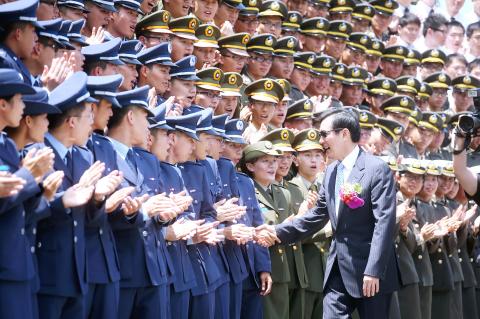President Ma Ying-jeou (馬英九) yesterday brushed aside concerns about possible negative impacts on the local service industry of the recently signed cross-strait service trade agreement, and insisted the pact will facilitate the nation’s bid to join the Trans-Pacific Partnership (TPP) and other regional free-trade agreements (FTAs).
“The service trade agreement prepares us [Taiwan] for deeper trade liberation. We have a competitive advantages in the service industry, and there is no need to worry about the pact and underestimate our strengths,” he said at a joint graduation ceremony for military academies in Greater Kaohsiung.
If ratified, the agreement, which was signed on Friday last week in Shanghai by representatives of Taiwan’s Straits Exchange Foundation and China’s Association for Relations Across the Taiwan Straits, would open up 64 sectors of Taiwan’s service industry to Chinese investment, while China would open 80 sectors to Taiwanese businesses.

Photo: CNA
Lawmakers reached an agreement on Tuesday to review the agreement item-by-item and vote separately on each of its articles and sector-specific commitments, contrary to the hope of the Ma administration that the legislature would vote on the agreement as a whole.
Lawmakers also agreed at Tuesday’s meeting that the pact cannot take effect without the legislature’s ratification.
Ma yesterday defended the government’s efforts to contribute to the nation’s trade liberalization, saying the newly signed pact requires both Taiwan and China to open the service market and that Taiwan’s competitive service industry can enhance its development in China by entering its vast consumer market.
Citing the example of the opening up of the film industry across the Taiwan Strait under the Economic Cooperation Framework Agreement (ECFA), Ma said the nation’s film industry has since generated revenues of more than NT$3 billion (US$99.8 million) in China, while the average box office sales for Chinese movies screened in Taiwan in the past three years was NT$24 million.
Ma also stressed the importance of joining the TPP and the Regional Comprehensive Economic Partnership (RCEP) for the nation to become a major global trading partner, and avoid lagging behind in pursuing regional economic integration.
“We are not yet qualified to join [the TPP and RCEP]. Taiwan is soon to sign economic cooperation pacts with Singapore and New Zealand, and these pacts are major prerequisites for us to join regional free-trade blocs,” he said.
Defending cross-strait exchanges in economic, cultural and other sectors, Ma said the government will continue to promote peace across the Taiwan Strait and seek to resolve disputes through diplomacy, even though China has not scaled back military deployments aimed at Taiwan.
Separately yesterday, Executive Yuan spokesperson Cheng Li-wun (鄭麗文) said the government is set to begin a series of nationwide public hearings to explain the service trade agreement.
Ma, Vice President Wu Den-yih (吳敦義), Premier Jiang Yi-huah (江宜樺) and Vice Premier Mao Chi-kuo (毛治國), along with government officials in charge of the policy and regulatory authorities of concerned service sectors, are to attend events aimed at fostering public understanding of the trade pact via discussions and presentations, Cheng said.
In holding more than 100 public hearings around the nation, beginning this weekend, government officials are to explain how the agreement would benefit Taiwan and provide businesses opportunities in China, while laying out complementary measures to reduce the negative impacts of further market liberalization on local industries, the Executive Yuan said.
Information regarding the timing and locations of the events will be made available online soon to encourage as many people as possible to join the discussion, the Executive Yuan said.
Additional reporting by Shih Hsiu-chuan

Taiwanese can file complaints with the Tourism Administration to report travel agencies if their activities caused termination of a person’s citizenship, Mainland Affairs Council Minister Chiu Chui-cheng (邱垂正) said yesterday, after a podcaster highlighted a case in which a person’s citizenship was canceled for receiving a single-use Chinese passport to enter Russia. The council is aware of incidents in which people who signed up through Chinese travel agencies for tours of Russia were told they could obtain Russian visas and fast-track border clearance, Chiu told reporters on the sidelines of an event in Taipei. However, the travel agencies actually applied

New measures aimed at making Taiwan more attractive to foreign professionals came into effect this month, the National Development Council said yesterday. Among the changes, international students at Taiwanese universities would be able to work in Taiwan without a work permit in the two years after they graduate, explainer materials provided by the council said. In addition, foreign nationals who graduated from one of the world’s top 200 universities within the past five years can also apply for a two-year open work permit. Previously, those graduates would have needed to apply for a work permit using point-based criteria or have a Taiwanese company

The Shilin District Prosecutors’ Office yesterday indicted two Taiwanese and issued a wanted notice for Pete Liu (劉作虎), founder of Shenzhen-based smartphone manufacturer OnePlus Technology Co (萬普拉斯科技), for allegedly contravening the Act Governing Relations Between the People of the Taiwan Area and the Mainland Area (臺灣地區與大陸地區人民關係條例) by poaching 70 engineers in Taiwan. Liu allegedly traveled to Taiwan at the end of 2014 and met with a Taiwanese man surnamed Lin (林) to discuss establishing a mobile software research and development (R&D) team in Taiwan, prosecutors said. Without approval from the government, Lin, following Liu’s instructions, recruited more than 70 software

Taiwanese singer Jay Chou (周杰倫) plans to take to the courts of the Australian Open for the first time as a competitor in the high-stakes 1 Point Slam. The Australian Open yesterday afternoon announced the news on its official Instagram account, welcoming Chou — who celebrates his 47th birthday on Sunday — to the star-studded lineup of the tournament’s signature warm-up event. “From being the King of Mandarin Pop filling stadiums with his music to being Kato from The Green Hornet and now shifting focus to being a dedicated tennis player — welcome @jaychou to the 1 Point Slam and #AusOpen,” the